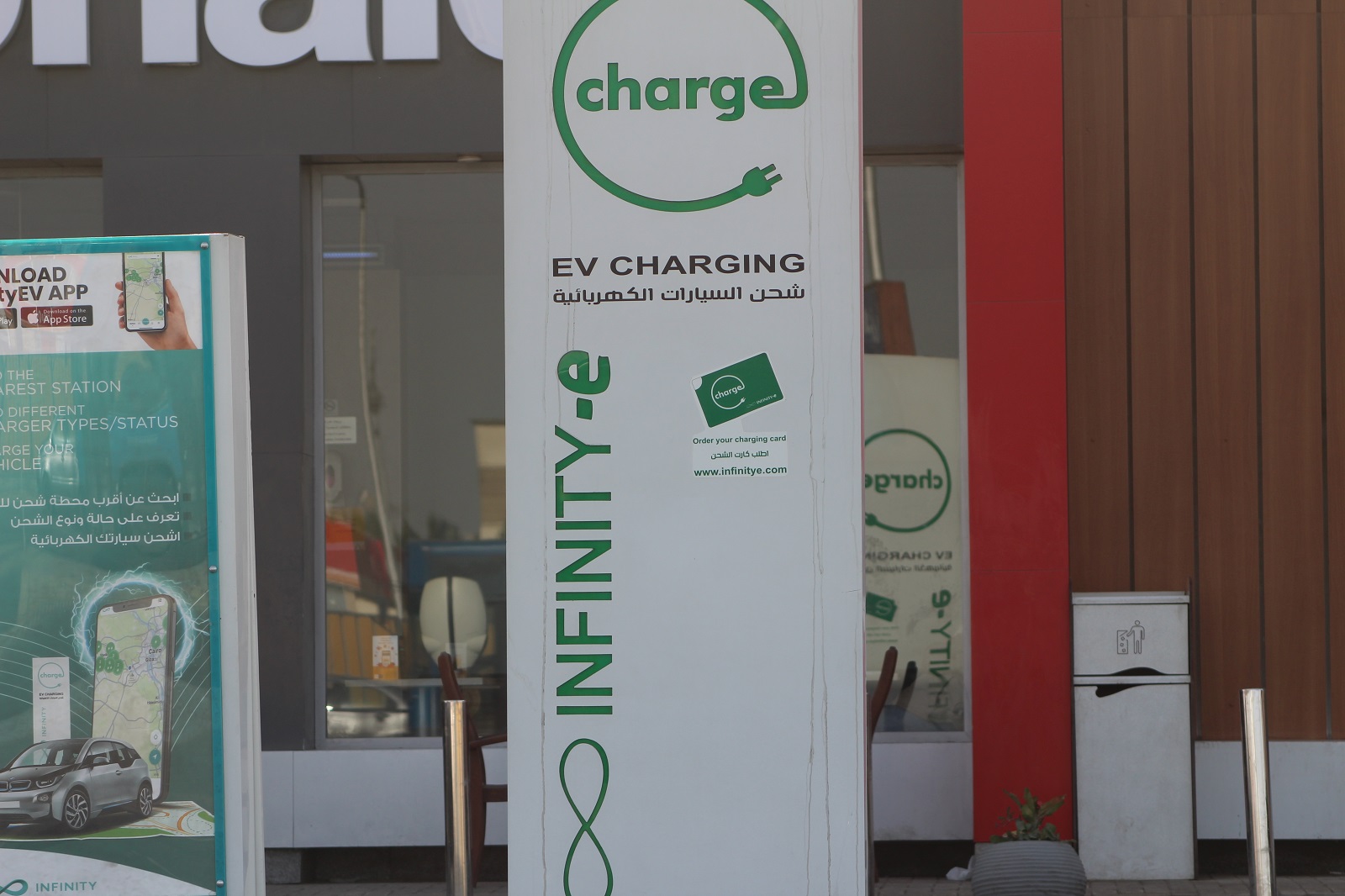
Want to buy an EV? Here are the options.

Want to buy an EV? The electric vehicle industry in Egypt is still nascent — but options are available if you want to buy a new EV today. Price tags are relatively high, maintenance and repairs can be a challenge, and charging infrastructure is spotty right now. But between the rapid global transition to EVs, a government-led drive to localize the industry and get the needed infrastructure in place, and rising demand among a certain segment of the population, the market is set to boom by the end of this decade. Here’s your guide to which models are currently available, how much they’ll set you back — and some points to consider before you decide to make the switch.
There are already a handful of EVs on our roads: Almost 1.8k electric vehicles are licensed in Egypt, according to figures from the Egyptian Compulsory Motor Insurance Pool (ECIP) seen by Enterprise. Volkswagen’s ID line has been the most popular so far among Egyptian consumers, with licenses issued for about 336 vehicles between July 2021 and January 2023. Some 96 Tesla vehicles, 46 electric BMWs and 26 Porsche Models were licensed over the same period.
These purchases have mostly come through private imports: “The majority of sales have come through private or dealership-facilitated imports,” Tamer Kotb, commercial director at Abou Ghaly Motors, tells us. “Only a small fraction of the EVs available in the market have come through authorized agents with agreements with EV manufacturers.” Remember: EVs enter the country with zero customs duties.
EVs aren’t the easiest to maintain and repair right now: Those who can afford an EV may have cause to hesitate over maintenance and repair challenges, Kotb says. “People buying imported EVs through private or dealership facilitated imports will have to import spare parts if anything goes wrong and don’t have the benefit of technical support or warranty — which makes buying an EV a little risky,” Kotb tells us
Though an electric model could bring savings on maintenance down the road: “Over the long term there are a lot of savings from purchasing an EV. Maintenance and repair costs are 80-90% of your ordinary fossil-fuel powered car. There aren't as many components that break or require replacing so the total ownership cost is lower than a regular car over an eight or nine year period,” Kotb says.
Infrastructure is still a work in progress: Our friends at renewable energy player Infinity have built at least 190 charging stations so far nationwide,according to an interactive map from local player Electrified. The company is planning to up the number of its charging stations to 300 by 2024, part of a plan with the government to eventually set up 3k stations across the country.
You’ll likely want to invest in a home charging station: Even if you happen to have an EV charging station close to home, it's best to invest in a home charging station, Kotb says. A home charging station will use AC, or alternating current — the stuff that is transmitted through the national grid and comes out of your wall socket. While slower than the alternative — DC, or direct current — AC is cheaper. AC charging also avoids depleting your EV battery’s health, Kotb told us.
A home charging station costs roughly EGP 29k – 38k to buy and install, a representative at EV car dealership El Eman told us. You’ll also need a cable, which runs at around EGP 6k.
You folks say you’re eager to make the switch: Some 90% of respondents to our Enterprise EV survey late last year said they’re planning to buy an EV within the next 10 years — and one in five respondents said they’ll make a purchase in the next 12 months. Only 3% of those we surveyed already own an EV.
EVs could be your only option as soon as 2030: “If we look at 2030, almost all automotive manufacturers will exclusively be making EVs,” Kotb says. “So for a country like Egypt that relies on imports to meet demand for new cars, the transition is inevitable. People looking to buy new cars in about seven years from now will likely not be able to find any new models that aren’t electric.”
But it could be worth waiting until local assembly kicks off: Locally assembled vehicles — some of which could be sold at around EGP 300-350k, our sources tell us — will be crucial for EV adoption to really take off in Egypt, since imported EVs currently remain far more expensive than their fossil-fuel guzzling counterparts. Our first locally manufactured EVs could roll off production lines soon as the government works on incentives to localize the industry as part of its hotly anticipated automotive strategy. Several companies have recently announced plans to start local production:
- Stellantis, Nissan, and Al Mansour Automotive could invest a total of USD 145 mn to assemble traditional and electric vehicles in Egypt over the next three years under the automotive strategy;
- Abou Ghaly plans to start locally assembling Geely EVs at some point this year.
- Al Mansour Auto and GM are looking to locally assemble up to 15k EVs in Egypt over the next three years;
- El Nasr Automotive has ambitions to begin assembling EVs this year but is yet to find a foreign partner to help produce them;
- The Arab Academy for Science, Technology and Maritime Transport has said it wants to produce ultra-cheap EVs.
Can’t wait? We spoke to a number of dealerships to find out just how much the currently available stock of EVs will set you back:
GEELY:
- Geometry C (400 km range) — USD 36 – 37k
- Geometry C (550 km range) — USD 39.9 – 40k
ZOTYE:
- E200 — EGP 335k
BYD:
- HAN — EGP 1.3 – 2.0 mn (depending on trim)
- QIN — EGP 950k – 1.3 mn (depending on trim)
VOLKSWAGEN:
- ID.3 Pure — EGP 1.0 – 1.1 mn
- ID.4 Pure — EGP 1.2 – 1.6 mn
- ID.6 X — EGP 1.4 – 1.7 mn
TOYOTA:
- C-HR (EV) — EGP 1.2 mn
- IZOA — EGP 1.1 mn
CHEVROLET:
- Menlo — EGP 925k – 1.2 mn
AUDI:
- Q5 e-tron — EGP 2.3 – 2.6 mn
TESLA:
- Model Y — EGP 2.3 – 2.8 mn
- Model 3 — EGP 2.0 – 2.7 mn
Your top green economy stories for the week:
- Egypt x Copenhagen Infrastructure Partners: Representatives from the Danish infrastructure investor met Planning Minister Hala El Saeed to discuss green investment opportunities in Egypt. (Statement)
- The Electricity Ministry received a nearly completed draft of the national hydrogen strategy and is working to complete it. The government is aiming to publish the strategy before the beginning of Ramadan at the end of March, sources told us last month.
- A fresh World Bank grant to tackle waste: The World Bank will grant the government’s Greater Cairo pollution reduction project a USD 9.1 mn grant to improve the management of e-waste and healthcare waste disposal systems.
Enterprise is a daily publication of Enterprise Ventures LLC, an Egyptian limited liability company (commercial register 83594), and a subsidiary of Inktank Communications. Summaries are intended for guidance only and are provided on an as-is basis; kindly refer to the source article in its original language prior to undertaking any action. Neither Enterprise Ventures nor its staff assume any responsibility or liability for the accuracy of the information contained in this publication, whether in the form of summaries or analysis. © 2022 Enterprise Ventures LLC.
Enterprise is available without charge thanks to the generous support of HSBC Egypt (tax ID: 204-901-715), the leading corporate and retail lender in Egypt; EFG Hermes (tax ID: 200-178-385), the leading financial services corporation in frontier emerging markets; SODIC (tax ID: 212-168-002), a leading Egyptian real estate developer; SomaBay (tax ID: 204-903-300), our Red Sea holiday partner; Infinity (tax ID: 474-939-359), the ultimate way to power cities, industries, and homes directly from nature right here in Egypt; CIRA (tax ID: 200-069-608), the leading providers of K-12 and higher level education in Egypt; Orascom Construction (tax ID: 229-988-806), the leading construction and engineering company building infrastructure in Egypt and abroad; Moharram & Partners (tax ID: 616-112-459), the leading public policy and government affairs partner; Palm Hills Developments (tax ID: 432-737-014), a leading developer of commercial and residential properties; Mashreq (tax ID: 204-898-862), the MENA region’s leading homegrown personal and digital bank; Industrial Development Group (IDG) (tax ID:266-965-253), the leading builder of industrial parks in Egypt; Hassan Allam Properties (tax ID: 553-096-567), one of Egypt’s most prominent and leading builders; and Saleh, Barsoum & Abdel Aziz (tax ID: 220-002-827), the leading audit, tax and accounting firm in Egypt.